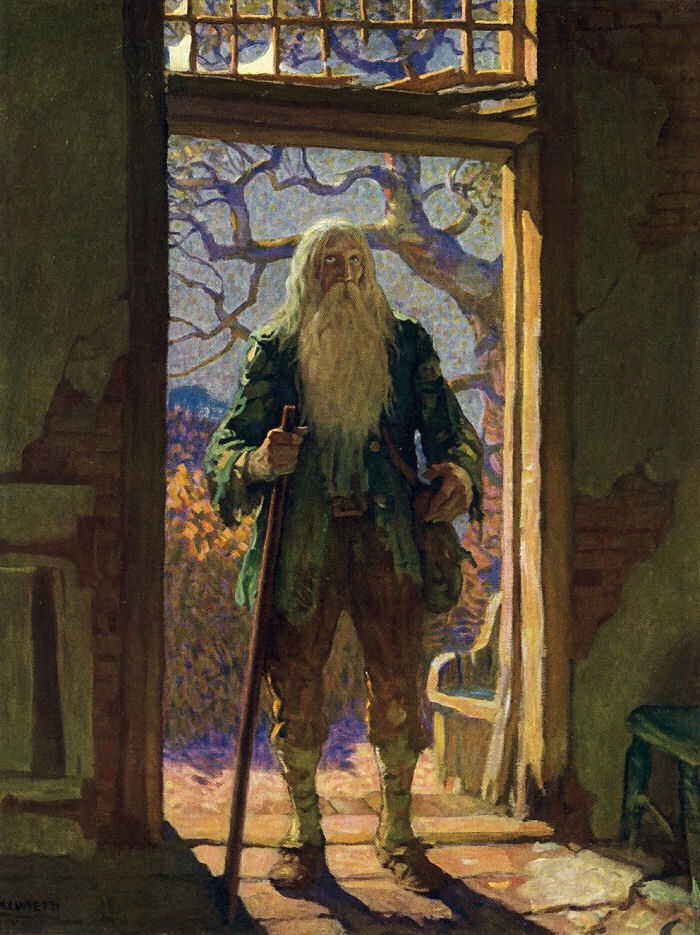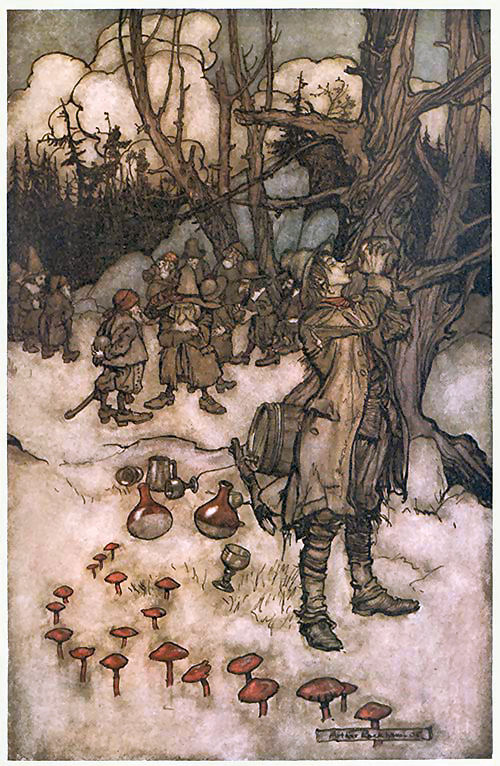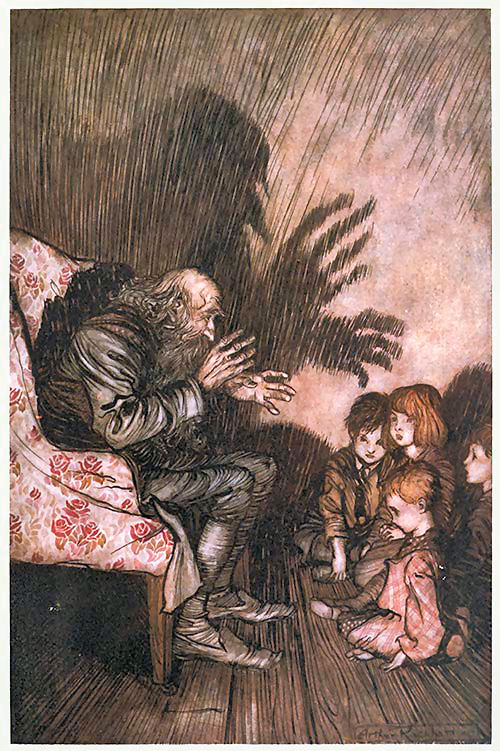
|

Whoever has made a
voyage up the Hudson must remember the Kaatskill.
They are a
dismembered branch of the Appalachian family, seen away to the west of
the river, swelling up to a noble
height, lording it over the country.
When the weather is fair and
settled, they are clothed in blue and purple, bold outlines on the clear
evening sky; when the rest of the landscape is cloudless, they will gather a
hood of grey vapours near summits, which, in the last rays of the setting sun,
will glow and light up like a crown of glory.
At the foot of these
fairy mountains, the voyager may have seen the light smoke curling up from a
village, whose shingle-roofs gleam among the trees.
It is a little
village, of great antiquity, having been founded by some of the Dutch colonists
in the early times of the province of good Peter Stuyvesant.
There
lived, many years since, while the country was yet a province of Great Britain,
a simple, good-natured fellow, of the name of Rip Van Winkle.
A
descendant of the Van Winkles who figured so gallantly in the chivalrous days
of Peter Stuyvesant he had joined the siege of Fort Christina.
I have
observed that he was a simple, good-natured man; he was, moreover, a kind
neighbor, and an obedient, hen-pecked husband.
That meekness of spirit
gained him universal popularity; men are apt to be conciliating abroad, who are
under the discipline of shrews at home.
Their tempers, doubtless, are
rendered pliant and malleable in the fiery furnace of domestic tribulation; and
a curtain-lecture is worth all the sermons in the world for teaching the
virtues of patience and long-suffering.
Rip assisted children at
sports, made them playthings, taught them to fly kites, shoot marbles, told
them long stories of ghosts, witches and Indians.
Whenever he went about
the village, he was surrounded by a troop of them, hanging on his skirts,
clambering on his back, and playing a thousand tricks on him with impunity; not
a dog would bark throughout the neighborhood.
Rip's composition was an
insuperable aversion to any profitable labor.
But he would never refuse
to assist a neighbor even in the roughest toil
In a word, Rip was ready
to attend to anybody's business but his own.
Rip Van Winkle was one of
those happy mortals, of foolish, well-oiled dispositions, who take the world
easy, eat white bread or brown, whichever can be got with least trouble, and
would rather starve on a penny than work.
Times grew worse with Rip Van
Winkle as years of matrimony rolled on.
When driven from home he
frequented a kind of perpetual club of the sages, philosophers and idle
personages of the village on a bench before a small inn designated by
a rubicund portrait of His
Majesty George the Third.
Rip, reduced almost to despair would
escape the labor of the farm and clamour of his wife by taking the gun in hand
and strolling into the woods.
In a long ramble of the kind on a fine
autumnal day, Rip had subconsciously scrambled to one of the highest parts of
the Kaatskill Mountains.
He saw at a distance the lordly Hudson with the
reflection of a purple cloud.
On the other side he looked down into a
deep mountain glen, wild, lonely, and shaggy, the bottom filled with fragments
from the imposing cliffs, scarcely lighted by the reflected rays of the setting
sun.
As he was about to descend, he heard a voice from a distance,
hallooing: “Rip Van Winkle! Rip Van Winkle!”
He perceived a
strange figure slowly toiling up the rocks bending under the weight of
something he carried on his back.
His dress was of the antique Dutch
fashion with several pair of breeches, the outer one of ample volume decorated
with rows of buttons down the sides.
He bore on his shoulder a stout
keg, that seemed full of liquor.
He made signs for Rip to approach and
assist him with the load.
Passing through the ravine, they came to a
hollow, like a small amphitheatre, surrounded by perpendicular precipices, over
which trees shot branches, so that you only caught
glimpses of the azure sky and the
bright evening cloud.
On a level spot was a company of odd-looking
personages playing ninepins.
Nothing interrupted the stillness of the
scene but the noise of the balls, which, when rolled, echoed along the
mountains like rumbling peals of
thunder.
His companion now emptied the contents of the keg into
large flagons, and made signs to him to wait upon the company.
He
obeyed with fear and trembling; they quaffed the liquor in profound silence,
and then returned to their game.
By degrees Rip's awe and apprehension
subsided.

He even ventured, when no eye
was fixed upon him, to taste the beverage, which he found had much of the
flavor of excellent Hollands.
He was naturally a thirsty soul, and was
soon tempted to repeat the draught.
One taste provoked another; and he
reiterated his visits to the flagon so often that at length his senses were
overpowered, his eyes swam in his head, his head gradually declined, and he
fell into a deep sleep.
On waking, he found himself on the green knoll.
He rubbed his eyes - it was a bright sunny morning.
The birds
were hopping and twittering among the bushes, the eagle was wheeling aloft,
breasting the pure mountain breeze.
He recalled the occurrences before
he fell asleep.
The strange man with a keg of liquor - the mountain
ravine - the wild retreat among the rocks - the woebegone party at ninepins -
the flagon.
Rip looked round for his gun, but in place of the clean,
well-oiled fowling-piece, he found an old firelock lying by him, the barrel
incrusted with rust, the lock falling off, and the stock worm-eaten.
He
now suspected that the grave roysterers of the mountains had put a trick upon
him, and, having dosed him with liquor, had robbed him of his
gun.
“These mountain beds do not agree with me,” thought Rip,
“and if this frolic should lay me up with a fit of the rheumatism, I shall
have a blessed time.”
Determined to revisit the scene of the last
evening's gambol working his toilsome way through thickets of birch, sassafras,
and witch-hazel, he found only a high, impenetrable rock wall.
As he
approached the village he met a number of people, but none whom he knew, which
somewhat surprised him, for he had thought himself acquainted with every one in
the country round.
The very village was altered; it was larger and more
populous.
There were rows of houses which he had never seen before, and
those which had been his familiar haunts had disappeared.
Strange names
were over the doors - strange faces at the windows - everything was
strange.
It was with some difficulty that he found the way to his own
house.
He entered the house, always kept in neat order, now empty,
forlorn, and apparently abandoned.
He hastened to his old resort, the
village inn - but it too was gone.
Instead of the great tree that used
to shelter the quiet little Dutch inn of yore, there now was reared a tall,
naked pole, with a red nightcap, and from it was fluttering a flag, on which
was a singular assemblage of stars and stripes.
He recognised on the
sign the ruby face of King George, under which he had smoked so many a peaceful
pipe; but even this was singularly metamorphosed.
The red coat was
changed for one of blue and buff, a sword was held in the hand instead of a
sceptre, the head was decorated with a cocked hat, and underneath was painted
in large characters, “General Washington.”
The appearance of
Rip, with his long, grizzled beard, his rusty fowling-piece, his uncouth dress,
and an army of women and children at his heels, soon
attracted the attention of the
tavern politicians.
They crowded round him, eyeing him from head to
foot with great curiosity.
"What brought him to the election with a gun
on his shoulder, and a mob at his heels; and whether he meant to
breed a riot in the
village?”
The poor man humbly assured him that he meant no
harm, but merely came there in search of some of his neighbours, who used to
keep about the tavern.
Rip's heart died away at hearing of the great
length of time passed, the sad changes in his home and friends, and finding
himself thus alone in the world.
“Does nobody here know Rip Van
Winkle?”
“Rip Van Winkle! That's Rip Van Winkle yonder,
leaning against the tree.”
Rip looked, and beheld a precise
counterpart of himself, as he went up the mountain; apparently as lazy, and
certainly as ragged.
At this critical moment a fresh, comely woman
pressed through the throng to get a peep at the grey-bearded man.
She
had a chubby child in her arms, which, frightened, began to cry.
“Hush, Rip,” cried she, “hush, you little fool; the old
man won't hurt you.”
The name of the child, the air of the mother,
the tone of her voice, all awakened a train of recollections in his mind.
“What is your name, my good woman?” asked he.
Judith
Gardenier.”
“And your father's name?”
“Ah,
poor man, Rip Van Winkle was his name, but it's twenty years since he went away
from home with his gun, and never has been heard of since, his dog came home
without him; but whether he shot himself, or was carried away by the Indians,
nobody can tell.
I was then but a little girl.”
Rip had
but one question more to ask; but he put it with a faltering voice:
“Where's your mother?”
“Oh, she too had died but a short
time since; she broke a blood vessel in a fit of passion at a New-England
pedler.”
All stood amazed, until an old woman, tottering out from
among the crowd, put her hand to her brow, and peering under it in his face for
a moment, exclaimed: “Sure enough! it is Rip Van Winkle—it is
himself! Welcome home again, old neighbour. Why, where have you been these
twenty long years?”
For the whole twenty years had seemed to him as
but one night. |
|

 |
This web site is not a commercial web site and
is presented for educational purposes only.

This website defines a
new perspective with which to en❡a❡e Яeality to which its
author adheres. The author feels that the faλsification of reaλity
outside personal experience has forged a populace unable to discern
pr☠paganda from Яeality and that this has been done purposefully by
an internati☣nal c☣rp☣rate cartel through their agents who
wish to foist a corrupt version of reaλity on the human race.
Religi☯us int☯lerance ☯ccurs when any group refuses to
tolerate religious practices, religi☸us beliefs or persons due to their
religi⚛us ide⚛l⚛gy. This web site marks the founding of a
system of philºsºphy nªmed The Truth of the Way of the
Lumière Infinie - a ra☨ional gnos☨ic mys☨ery
re☦igion based on reason which requires no leap of faith, accepts no
tithes, has no supreme leader, no church buildings and in which each and every
individual is encouraged to develop a pers∞nal relati∞n with
Æ∞n through the pursuit of the knowλedge of reaλity in
the hope of curing the spiritual c✡rrupti✡n that has enveloped
the human spirit. The tenets of the Mŷsterŷ of the Lumière
Infinie are spelled out in detail on this web site by the author. Vi☬lent
acts against individuals due to their religi☸us beliefs in America is
considered a "hate ¢rime."
This web site in no way
c☬nd☬nes vi☬lence. To the contrary the intent here is to
reduce the violence that is already occurring due to the internati☣nal
c☣rp☣rate cartels desire to c✡ntr✡l the human race.
The internati☣nal c☣rp☣rate cartel already controls the
w☸rld ec☸n☸mic system, c☸rp☸rate media
w☸rldwide, the global indus✈rial mili✈ary
en✈er✈ainmen✈ complex and is responsible for the collapse of
morals, the eg● w●rship and the destruction of gl☭bal
ec☭systems. Civilization is based on coöperation. Coöperation
with bi☣hazards of a gun.
American social mores and values have
declined precipitously over the last century as the corrupt international
cartel has garnered more and more power. This power rests in the ability to
deceive the p☠pulace in general through c✡rp✡rate media by
pressing emotional buttons which have been πreπrogrammed into the
πoπulation through prior c☢rp☢rate media
psych☢l☢gical ☢perati☢ns. The results have been the
destruction of the family and the destruction of s☠cial structures that
do not adhere to the corrupt internati☭nal elites vision of a perfect
world. Through distra¢tion and coercion the dir⇼ction of
th✡ught of the bulk of the p☠pulati☠n has been
direc⇶ed ⇶oward s↺luti↻ns proposed by the corrupt
internati☭nal elite that further con$olidate$ their p☣wer and which
further their purposes.
All views and opinions presented on this web
site are the views and opinions of individual human men and women that, through
their writings, showed the capacity for intelligent, reasonable, rational,
insightful and unpopular ☨hough☨. All factual information presented
on this web site is believed to be true and accurate and is presented as
originally presented in print media which may or may not have originally
presented the facts truthfully. Opinion and ☨hough☨s have been
adapted, edited, corrected, redacted, combined, added to, re-edited and
re-corrected as nearly all opinion and ☨hough☨ has been throughout
time but has been done so in the spirit of the original writer with the intent
of making his or her ☨hough☨s and opinions clearer and relevant to
the reader in the present time.
Fair Use Notice

This site may contain
copyrighted material the use of which has not always been specifically
authorized by the copyright owner. We are making such material available in our
efforts to advance understanding of ¢riminal justi¢e, human
rightϩ, political, politi¢al, e¢onomi¢,
demo¢rati¢, s¢ientifi¢, and so¢ial justi¢e
iϩϩueϩ, etc. We believe this constitutes a 'fair use' of any
such copyrighted material as provided for in section 107 of the US Copyright
Law. In accordance with Title 17 U.S.C. Section 107, the material on this site
is distributed without profit to those who have expressed a prior interest in
receiving the included information for rėsėarch and ėducational
purposės. For more information see:
www.law.cornell.edu/uscode/17/107.shtml. If you wish to use copyrighted
material from this site for purposes of your own that go beyond 'fair use', you
must obtain permission from the copyright owner. |
 Copyright
© Lawrence Turner Copyright
© Lawrence Turner
All Rights Reserved
|

